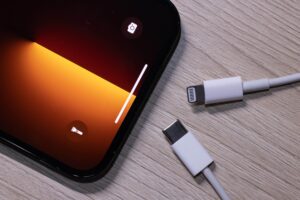
The UK will not join the EU in making USB-C charging ports mandatory on all phones and other electronic devices, the government has confirmed.
The EU’s rule, announced in Strasbourg on Tuesday, means Apple will have to change the charging port on its devices in all 27 EU countries by 2024.
Apple will have to start fitting its iPhones and other devices with a USB-C charger, rather than its own proprietary power connector technology, known as ‘Lightning’.
Since the EU’s announcement, it had been uncertain if the decision could affect Apple products sold in the UK and other non-EU countries in Europe.
But a UK government spokesperson has said: ‘We are not currently considering replicating this requirement.’
However, Northern Ireland will have to comply with the rule due to current post-Brexit arrangements – namely, the Northern Ireland Protocol.
The Northern Ireland Protocol was struck in order to prevent a post-Brexit hard border on the island of Ireland, separating the north from the republic.
But it means Northern Ireland continues to follow some European Single Market rules. The Republic of Ireland is an EU country, so it will also have to comply.
This complicates things for Apple; the firm might have to make devices with USB-C ports to sell in EU countries and Northern Ireland, as well as making devices with a Lightning ports to sell in the UK and other non-EU countries.
To simplify things, Apple could just opt to make devices with USB-C ports in the whole of Europe.
The EU’s rule covers not just mobile phones, but tablets, e-readers, earbuds, digital cameras, headphones and headsets, handheld video game consoles and portable speakers.
Laptops also are covered, but manufacturers will have extra time to comply.
Apple fans in affected countries will of course be able to still use their old Lightning chargers and devices that have Lightning ports.
But new devices sold in the affected countries from 2024 will have to be USB-C.
Ultimately, it should make life easier for consumers fed up with rummaging through a tangle of cables for the right one.
The EU introduced the rule because it wants a uniform charging cord for smartphones and other devices to reduce electronic waste, but Apple argues this would limit innovation and hurt consumers.
The union estimates that discarded or unused chargers account for 11,000 metric tons of e-waste in Europe every year.
‘Consumers will be provided with clear information on the charging characteristics of new devices, making it easier for them to see whether their existing chargers are compatible,’ the EU said in its statement on Tuesday.
‘Buyers will also be able to choose whether they want to purchase new electronic equipment with or without a charging device.’
The new USB-C rule, which will take effect by autumn 2024, was originally announced last September, but came more than a decade after the European Parliament first pushed for it.
The decision will be formally ratified by European Parliament and among EU member states after the summer before entering into effect.
MailOnline contacted Apple for comment, but the tech giant is yet to reply.
The EU has also outlined standards for giving consumers the right to choose whether to buy new devices with or without a charger, which it estimates will save consumers 250 million euros (£212 million) a year.
‘Consumers will be provided with clear information on the charging characteristics of new devices, making it easier for them to see whether their existing chargers are compatible,’ the EU said in a statement.
‘Buyers will also be able to choose whether they want to purchase new electronic equipment with or without a charging device.’
While many electronics makers have started using USB-C sockets on their devices, Apple has been one of the main holdouts.
However, rumours have already indicated Apple may be planning to replace Lightning with USB-C, possibly in anticipation of the EU’s new rule.
Last month, analyst Ming-Chi Kuo predicted Apple will finally ditch the Lightning port for USB-C in its 2023 iPhone, rumoured to be called the iPhone 15.
Since 2012, iPhones have come with the company’s own Lightning port and connecting cables, which replaced the previous 30-pin connector.
However, the newest iPhone models have been shipping with a lightning-to-USB-C adapter cable, which allows the iPhone to be connected to a USB-C socket if needed.
Apple has been rapidly phasing out iPhone accessories that were previously included in the box with its iPhones.
iPhone 11, released in 2019, came with a pair of wired EarPods with Lightning connector, a USB to Lightning cable and a 5W USB power adaptor.
But its successors, iPhone 12, released in 2020, and iPhone 13, released last year, only came with the USB to Lightning cable in addition to the phone itself.
Apple had said this decision was taken to cut down on the environmental impact of its hardware.
Read more:
Britain will not follow EU ruling making USB C charging ports mandatory on all phones